MHLoppy
Currently studying CS and some other stuff. Best known for previously being top 50 (OCE) in LoL, expert RoN modder, and creator of RoN:EE’s community patch (CBP).
(header photo by Brian Maffitt)
- 7 Posts
- 16 Comments

 20·14 days ago
20·14 days agoOr 53.6 degrees Fahrenheit if you believe whoever wrote the page for Nissan lmao. I guess they just typed it into a converter with no context, and the converter spat out an answer amounting to “if your thermometer says it’s 12 degrees C, that would be 53.6 degrees F”… but without that context.

 34·18 days ago
34·18 days agoThanks for so politely and cordially sharing that information
edit: I would be even more appreciative if it were true: https://www.rockpapershotgun.com/rocket-league-ending-mac-and-linux-support-because-they-represent-less-than-0-3-of-active-players
Quoting their statement:
Regarding our decision to end support for macOS and Linux:
Rocket League is an evolving game, and part of that evolution is keeping our game client up to date with modern features. As part of that evolution, we’ll be updating our Windows version from 32-bit to 64-bit later this year, as well as updating to DirectX 11 from DirectX 9.
There are multiple reasons for this change, but the primary one is that there are new types of content and features we’d like to develop, but cannot support on DirectX 9. This means when we fully release DX11 on Windows, we’ll no longer support DX9 as it will be incompatible with future content.
Unfortunately, our macOS and Linux native clients depend on our DX9 implementation for their OpenGL renderer to function. When we stop supporting DX9, those clients stop working. To keep these versions functional, we would need to invest significant additional time and resources in a replacement rendering pipeline such as Metal on macOS or Vulkan/OpenGL4 on Linux. We’d also need to invest perpetual support to ensure new content and releases work as intended on those replacement pipelines.
The number of active players on macOS and Linux combined represents less than 0.3% of our active player base. Given that, we cannot justify the additional and ongoing investment in developing native clients for those platforms, especially when viable workarounds exist like Bootcamp or Wine to keep those users playing.

 2·18 days ago
2·18 days agoFair enough! I barely use its social side since most of the games I’ve played on there are singleplayer titles - honestly didn’t even know that wasn’t there yet!

 13·18 days ago
13·18 days agoI kinda understand it not being a priority; even if they dedicated the resources to both create and adequately maintain Linux support, I imagine very few of the games on the platform have native support anyway. Sure, many would work (to varying degrees) with the various bags of tricks available, but it’s still an extra step of compatibility that’s sort of beyond their immediate control.

 2·18 days ago
2·18 days agoI guess our opinions differ, because I don’t consider either of those to be “basics”. They’re nice features for e.g., Steam to have, sure, but they’re not “game launcher 101” imo.

 42·18 days ago
42·18 days agoWhat do you consider basic that it’s still missing? To be honest I’ve felt content with it as a game launcher for a while now, but I admittedly don’t use it that often either.

 5·24 days ago
5·24 days agoFYI: https://github.com/uBlockOrigin/uAssets/issues/9785
So consider using the official website, which is currently: https://lubuntu.me

 1·28 days ago
1·28 days agoWritten version on TechSpot: https://www.techspot.com/news/104223-wrong-about-zen-5.html

 4·1 month ago
4·1 month agoThe Linux performance seems to reinforce potential of OS issues: https://www.phoronix.com/review/ryzen-9600x-9700x

 4·1 month ago
4·1 month agoThe title feels a bit sensationalized, but it’s still an interesting explanation for some performance gap compared to expectations.

 10·2 months ago
10·2 months agoIntel fumbled hard with some of their recent NICs including the I225-V,[1][2] which took them multiple hardware revisions in addition to software updates to fix.
AMD also had to be dragged kicking and screaming to support earlier AM4 motherboard buyers to upgrade to Ryzen 5000 chips,[3][4] and basically lied to buyers about support for sTRX4, requiring an upgrade from the earlier TR4 to support third-gen Threadripper but at least committing to “long-term” longevity in return.[5][6] They then turned around and released no new CPUs for the
chipsetplatform, leaving people stranded on it despite the earlier promises.[7]I know it’s appealing to blindly trust one company’s products (or specific lineup of products) because it simplifies buying decisions, but no company or person is infallible (and companies in particular are generally going to profit-max even at your expense). Blindly trusting one unfortunately does not reliably lead to good outcomes for end-users.
edit: “chipset” (incorrectly implying TRX40) changed to “platform” (correctly implying sTRX4); added explicit mention of “AM4” in the context of the early motherboard buyers.
There’s currently no implementation (the repos are currently just skeletons), so it could just be a semantics difference right now.

 4·4 months ago
4·4 months agoCool idea, though I was surprised by the level of fidelity loss in the fountain example. I would’ve expected that to be a good case scenario for noise cancellation so maybe it just needs some more time to iterate and improve on its level of “false positive” removal.

 11·7 months ago
11·7 months agoExcluding Piledriver (?) to Zen, wouldn’t 30% be the highest inter-generational IPC increase in Intel/AMD CPUs in at least 15 years? The article’s original title also included quotes around “ABSURD”, as the term is being re-used from the source’s clickbait YouTube title lol.

 4·9 months ago
4·9 months agoArchive Options Failing
This one worked for me, useful if wanting to share the story elsewhere:








Fair point, but I guess I would hope that the person being paid to write the copy would check it, since getting that right seems like it’s part of their job description ¯\_(ツ)_/¯